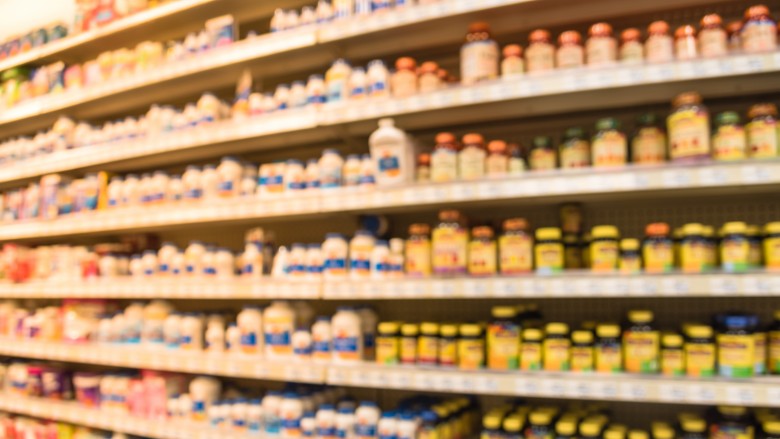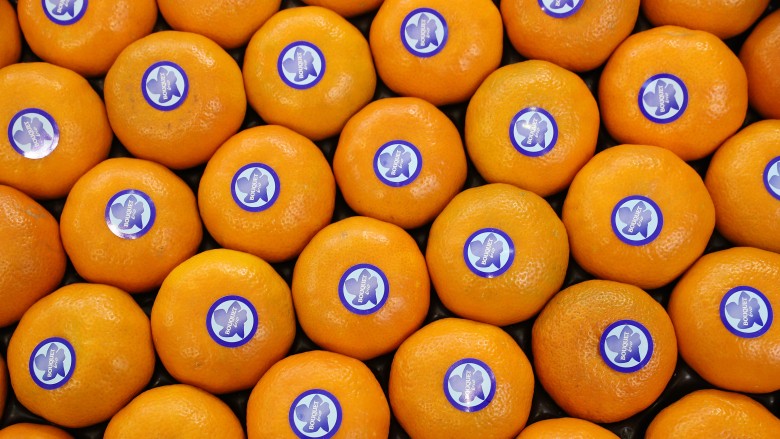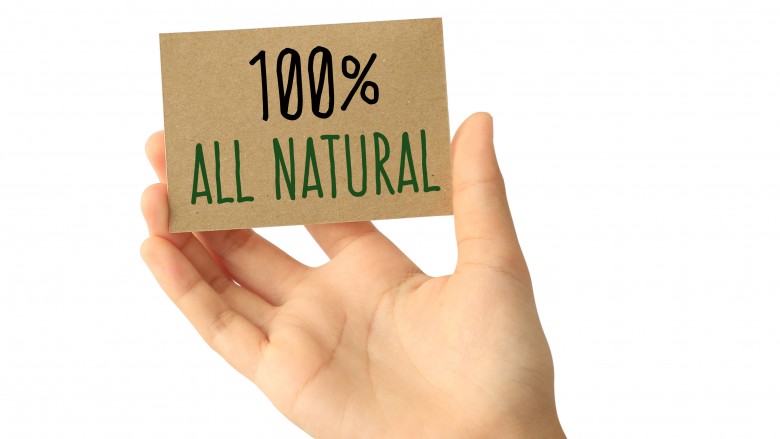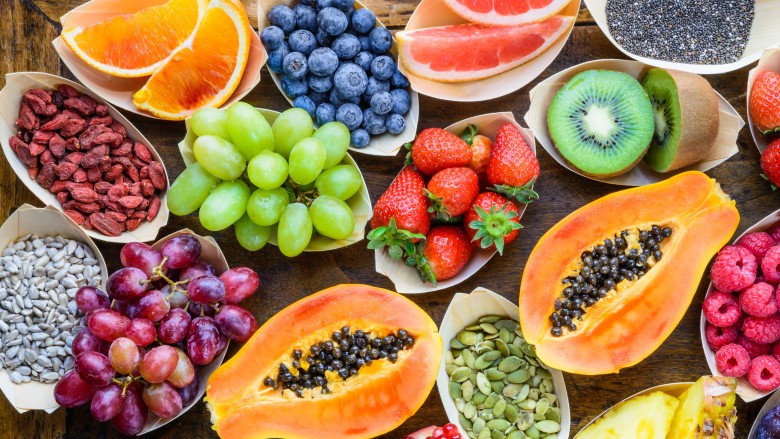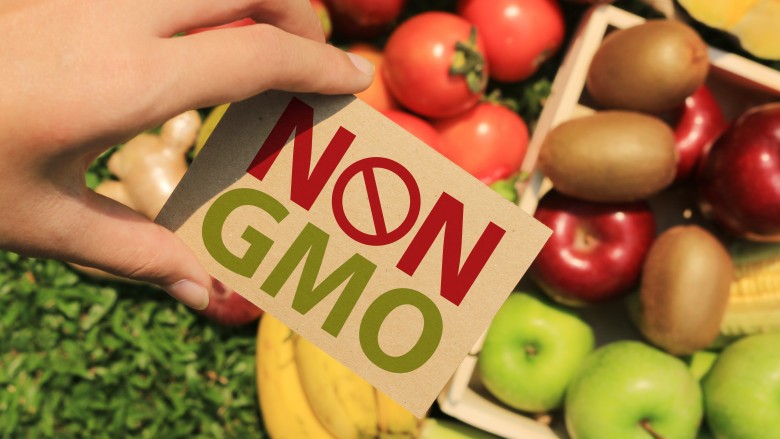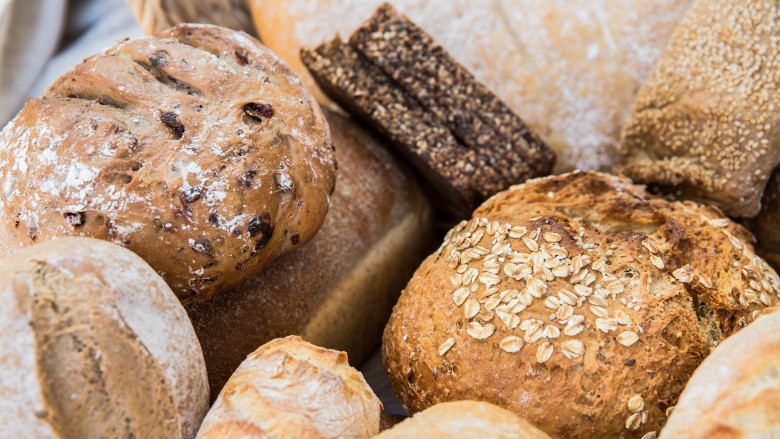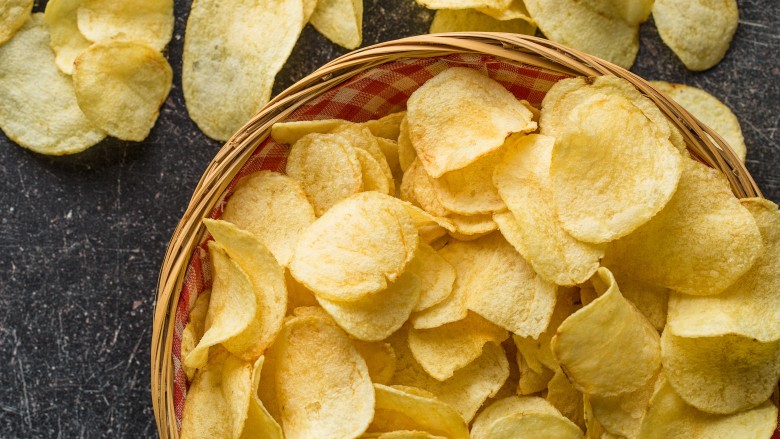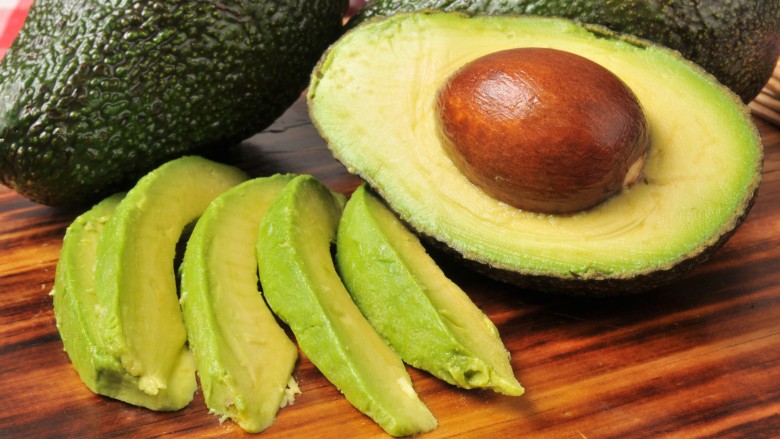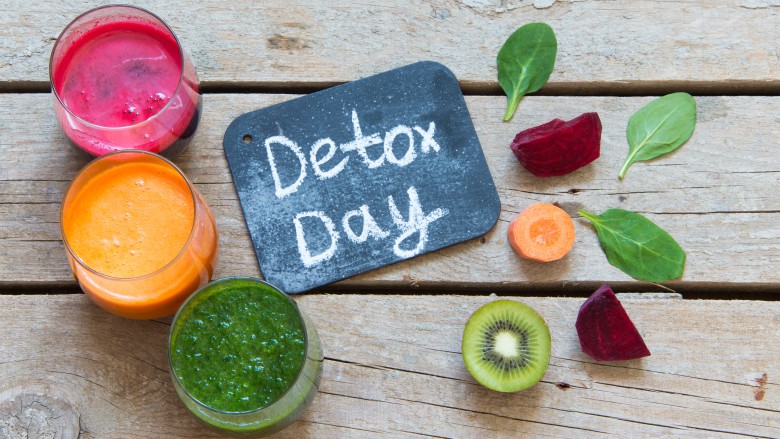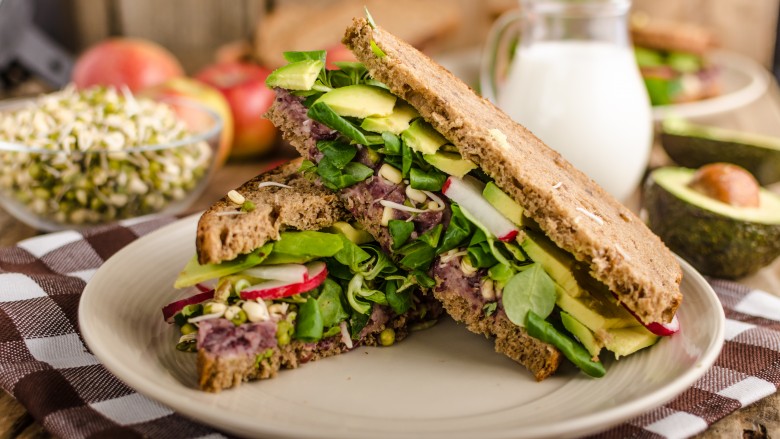Sneaky Ways The Health Food Industry Is Scamming You
It's nearly impossible to go a day without someone trying to push the newest healthy food trend on you, right? There are so many of them out there, it's hard to discern what might really help — and what's a complete scam. So how do you know what to believe and what to ignore? Here are some common ways the health food industry is trying to scam you.
Supplements aren't always the answer
There are a lot of supplements out there. And I mean a lot. If you've ever been inside a GNC or Whole Foods, you've seen the rows upon rows of colorfully-packaged pills, powders, and tonics. There's something for every part of your body: milk thistle for your liver, biotin for your hair and nails, fish oil for your heart — if there's an organ, there's a pill for it. But this $30 billion industry isn't all it's cracked up to be.
Andy De Santis, RD, MPH, tells me, "The harsh reality is that the majority of supplements on the market do NOT do what they claim to do. Vitamin/mineral supplements are a little bit different, but consuming these components from a pill rather than a balanced, varied whole food diet will only offer a fraction of the benefit, although the branding/packaging of these products would suggest otherwise!"
Also, supplements are not closely monitored by the FDA like prescription drugs or conventional food products, so their contents can vary wildly. Supplements can also be dangerous — even fatal. So be careful and make wise decisions regarding these products, and talk to your doctor before taking them.
Organic isn't always the best
The organic food industry makes more money every year, in spite of the fact that organic food is more expensive than conventional food. And organic does not necessarily equal healthy. Liz Blom, RD, notes, "For example, organic sugar is still sugar and will sabotage weight loss efforts if that is your goal. Are you the nutrition gatekeeper in your household? You'd better be prepared to slow down and read your labels. I've come close myself to buying portable juice packets for my children labeled as organic, only to look closer and find out its first ingredient is filtered water, followed by organic sugar and minimal juice. Talk about a near mom fail!"
Is organic food pesticide free? No, not even close. Is it healthier for you? Probably not. It certainly isn't easier on your wallet than conventional food. So why is it so popular? It could be that millennials, who consider themselves knowledgeable about food, are driving the market. But it could also be that most people don't realize there isn't all that much of a difference. Andy De Santis tells me, "I don't have a particular problem with these labels as this comes down to a personal consumer preference. There is currently no evidence, however, that organic food is any healthier for you. I'm not confident that the average consumer is aware of that."
"Natural" doesn't always mean what you think
Ever wonder what those labels that say "natural" really mean? Apparently not much. This label can be applied to anything, really, as long as it doesn't contain added color, artificial flavors, or synthetic substances. Other than that, though, these labels seem like just another marketing tool.
Jessica Levings, MS, RD, tells me, "Food products touted as 'natural' are just trying to entice consumers to pay more for products that are no better for them than foods without the term. Contrary to what many consumers think, 'natural' doesn't apply to the use of pesticides, hormones or antibiotics, and foods containing natural flavors and sweeteners like high fructose corn syrup can be labeled 'natural' ... Becoming an educated consumer and knowing what you're buying will help you eat more healthfully, naturally!" So your best bet is to buy whole ingredients rather than trust a nebulous label.
Superfoods aren't all you need
Blueberries. Salmon. Kale. These are just some of the foods that have been christened as 'superfoods' in popular parlance. Superfoods are foods that purport to provide a host of health benefits, including increased longevity and decreased risk of disease. So how does a food ascend to superstar status? There's no official, defining criteria for a superfood, although these foods do have a lot of nutritional value in the form of antioxidants, healthy fats, protein, and vitamins.
The hard truth is that superfoods, while indeed very healthy for you, likely aren't going to do much for you if you're not already consuming a healthy, balanced diet rich in vegetables and lean proteins. Certainly they're not going to counteract unhealthy behaviors like excessive sugar, fat, or alcohol consumption.
So in essence, a superfood is just a healthy food you should be eating anyway. If you bread it, fry it, coat it in flour, or douse it in sugar? Congratulations, you just made a superfood into a regular food.
Genetically modified foods aren't always dangerous
Genetically modified foods are safe. Study after study scientifically proves that GM foods pose absolutely no discernible risk whatsoever to humans, and that they are safe to cultivate, harvest, and consume. But that has done little to stop the GMO panic that has consumers up in arms and demanding labels on foods with genetically modified ingredients. A lot of that may be due to anxiety from folks who argue that more studies should be done. Others argue that foods should be labeled, period, whether the contents are potentially dangerous or not, citing that consumers have a right to know what they are putting in their bodies. Some brands have chosen to label themselves voluntarily, which will appeal to folks who fall into the latter category. And that's one way to get customers; by appealing to the paranoia, they rake in the profit. And that makes these brands the real winners here, all the way to the bank.
Not everyone needs to be gluten-free
In recent years, there has been exponential growth in the availability and variety of gluten-free products on the shelves of health food stores. In fact, the surge is so widespread that conventional grocery stores now have shelves, and in some cases, aisles, devoted to gluten-free pastas, breads, crackers, beers, and more. This has been a huge boon for folks diagnosed with celiac disease, which is a condition in which the body cannot tolerate gluten. However, only a very small percentage of the population (one in 100 worldwide) has this condition. So why are these products so popular?
One explanation could be allergies. In July of 2016, researchers at Columbia University identified non-celiac wheat sensitivity; this study rendered wheat intolerance scientifically credible in the absence of a celiac disease diagnosis. While the study did not confirm that gluten is directly responsible, it did vindicate the claims of folks whose symptoms abated upon removing gluten from their diet. More research is needed to identify gluten as the primary culprit.
Another explanation is that folks are just following a trend. Andy De Santis said, "There is a small but obviously significant portion of the population who have adverse reactions to gluten and rely on these products. What has happened, however, is that the gluten-free trend has gone mainstream and you have a growing number of people with no reason to avoid gluten, that are going out and spending extra money on these products." So in a nutshell, if you feel better not eating gluten, don't eat it. But if you blindly follow this marketing trend, you're likely being scammed.
"Light" isn't always healthier
"Light" lables are a prime example of how something that might seem like a healthy option is just another product on the shelf vying for your dollars. And these labels are found on a wide variety of products, from cookies to salad dressings to cheeses. So what exactly does "light" mean? According to the Code of Federal Regulations, a food product can carry the "light" label if it has 25 percent less calories than the original, comparable product. So light sour cream, while containing fewer calories than conventional sour cream, is still comprised of mostly fat. And light popcorn is still going to be comprised of mostly empty calories. Couple that with the chance that eating a "light" food may not satisfy your cravings like the conventional product, and it's fairly obvious that this is just another marketing ploy designed to make you feel like you're being healthier.
Fat-free isn't always good for you
Many foods are naturally fat-free, such as a variety of vegetables, fruits, and grains. Other foods, such as dairy products, meats, and fish, have naturally occurring fat content. And while eating excessive fat can be pretty bad for you, consuming products that have been processed to remove fat isn't going to be much better.
Liz Blom tells me, "When a food is altered to meet needs of a specialty diet, often times fats, sugars, salts and more are added in order to create the same mouth feel, texture, flavor and appearance. Again, depending on a person's goal, this can totally sabotage efforts to better a cholesterol profile, reduce sodium, control blood sugars or decrease a waistline."
So in cases of fat-free cheese and sour cream, for example, you might find added sugars and salts as well as textural thickeners to make it taste more like conventional cheese or sour cream. You're better off reaching for yogurt or other alternatives. Finally,healthy fats are a vital part of a balanced diet, so seek them out in moderation instead of stocking the house with processed, fat-free items.
Detox products don't work miracles
Perhaps the biggest way the health food industry is scamming you is with detox products. Hundreds upon hundreds of detox products are available, ready to help you cleanse your liver, slim you down, fix your skin ailments, flush your system — you name it, there's a product for it. And it's all hogwash. These pills, powders, diets, and fasting agents are actually more likely to do absolutely nothing for you than they are to cleanse you of imagined toxins. And in some cases, you're even putting yourself at risk.
Andy De Santis tells me that detox is "everyone's favorite 'it' word and is most often associated with expensive supplements and juice cleanses. There is no such thing as a pill or juice that will detox your body. In fact, juice is the last thing you want to put in you, especially if it is replacing whole fruits and vegetables. Want a detox? Start eating 8-10 servings of whole fruits and vegetables a day and let your body do the rest."
So don't waste your money on these sham products that do little more than drain your wallet of money. Eat right, exercise, get enough sleep, and drink alcohol only in moderation. Your liver and kidneys will do the rest.
There's really no such a thing as clean eating
Clean eating is another big health trend making the rounds. It's is usually defined as eating whole foods as much as possible, avoiding processed ingredients and favoring plants over other foods. But it too is, for the most part, just another marketing ploy.
Jessica Levings tells me, "As a registered dietitian, the term 'clean eating' makes me cringe more than any other fad diet or gimmick out there. While in theory clean eating focuses on whole, unprocessed foods, in reality it's just a marketing claim trying to trick consumers seeking out more healthful foods into paying more for the same processed products they've been buying at half the price... Consumers shouldn't put their money where their mouth is and pay more for foods touted as 'clean.' Seeking out whole grain based foods, unflavored dairy products, and no salt or sugar added fruits and vegetables in any form will offer substantially greater health benefits than a processed cheese sandwich labeled 'clean.'"
In a nutshell, clean eating has benefits, but there's nothing magical about it. Again, sticking to a sensible diet high in vegetables and lean protein and low in sodium and bad fats is the best course of action. And for any dietary advice, make an appointment with a registered dietitian for the best results. Don't be scammed by companies just after your money.

